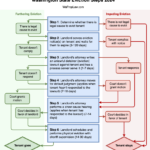Most of the time, when people come to us with landlord-tenant issues, they’re interested in something having to do with evictions. Therefore, we’ve created the following detailed resources for landlords seeking to evict residential tenants in Washington State:

How to Evict Tenants in Washington State – Landlord Guide (2024)
Washington eviction law has changed a lot in recent years. Be careful about trusting other eviction information on the internet, as much of it is outdated, incomplete, or otherwise inaccurate. Please also note that this article is very technical (i.e.,

Are illegal tenant lock-outs becoming the most cost-effective option?
Evictions are expensive–often costing $2,000-5,000. They also take a long time–usually at least four months from start to finish. Due to these high costs, frustrated landlords sometimes wonder whether it’s worth the risk of just skipping the eviction process and

Emotional Support Animals are a dumb idea but landlords can’t ignore them
We’ve been hearing lots of questions about emotional support animals in recent years. This article is about the legalities of emotional support animals. What are they, and does your tenant really have one? “Emotional support animals” are not “service animals”

How a MASSIVE error by Tacoma City Council gave us the “Landlord Fairness Code”
For reasons we don’t understand, official Tacoma news outlets have failed to cover the embarrassing story of how a mistake by the Tacoma City Council led to the passage of Tacoma’s “Landlord Fairness Code.” We explain the story here. What

Tacoma’s new “Landlord Fairness Code” – Landlord Guide (Updated 2024)
To understand this article, it will help if you have a baseline understanding of Washington eviction law, so consider checking out our guide to evicting a tenant in Washington. The “Landlord Fairness Code” is poorly written and difficult to implement

Washington Eviction Frequently Asked Questions (FAQ)
In this article, we’ll discuss some of our favorite questions about the Washington eviction process. If you’re looking for an overview on the process, check out our Washington State eviction guide, or our guides for Tacoma and Seattle. Below, we

Handy tips for Washington Landlords. Learn from our mistakes!
It’s no secret that Washington evictions can be long and expensive. It’s not just attorneys’ fees and court costs; often, the tenant doesn’t pay rent while the eviction is pending so the landlord is out several months of rent as
Seattle Rental Housing Laws – Landlord Guide (Updated 2024)
It’s tough being a landlord in Seattle these days, especially for mom-and-pop landlords who don’t deal with housing laws every day. In this article, we we provide an overview of Seattle rental housing laws. It’s important to understand where Seattle’s

Tacoma’s July 2023 Rental Law Changes – Landlord Guide (Updated 2024)
Most Washington landlord-tenant laws are set at the state level (which is why we’ve written our Washington Eviction Guide), but cities and counties can impose their own laws too. In July 2023, the City of Tacoma updated its rental housing

Washington State’s 2019 Eviction Law Changes – Full Landlord Guide
This article is old news. We’ve incorporated most of the below information in our new guide to evicting a tenant in Washington State. If you own and operate properties in Seattle or Tacoma, you might want to check out our

The (only) 17 reasons you can evict a tenant in Washington State
If you haven’t done so already, you might want to start by reading our guide to evicting a tenant in Washington State. If you own or operate properties in Seattle or Tacoma, you might also want to check out our

Commercial Lease Negotiations and Disputes – Protect Yourself!
Whether you’re a landlord or a tenant, negotiating favorable lease terms is critical to your success. As a business owner, finding your first office or a warehouse to increase inventory is critical to your business. As a landlord, finding a

Evicting Squatters, Guests, and Trespassers – Landlord Guide
We’ve written this article because there’s a lot of bogus information online about evicting squatters and other non-tenant residents. Much of this bad info seems to be written by property managers and realtors who confuse adverse possession with the laws

Why Tacoma’s new eviction bans are (probably) illegal
If you’re a Tacoma landlord, you’ve probably heard of Tacoma’s infamous (and ironically named) Landlord Fairness Code–the bombshell anti-landlord ordinance voted into law as initiative no. 1 in November 2023. In other articles on this website, we’ve covered both the

Damage Deposits and Fees in Washington State
Fees and deposits are essentially a form of insurance intended to prevent landlords from losing money if a tenant damages the unit or fails to pay. In this article, we explain how the Washington Residential Landlord Tenant Act deals with
Most of the time, when people come to us with landlord-tenant issues, they’re interested in something having to do with evictions. Therefore, we’ve created the following detailed resources for landlords seeking to evict residential tenants in Washington State:
However, there’s a lot more to the landlord-tenant relationship than evictions. In this article, we discuss what a lease is, and some of the rights both landlords and tenants are entitled to under Washington State law.
Legally speaking, what is a lease?
When a landlord and tenant sign a lease or rental agreement, that agreement is a contract that assigns certain rights and responsibilities between the parties. As you may know, the terms of a contract are like additional laws that you agree to abide by, and so they are usually enforceable in court. Therefore, as with any contract, when one party fails to perform under the lease, the other party has certain recourses against the non-performing party.
In practice, it is usually the landlord that seeks to enforce the contract against an allegedly non-compliant tenant rather than the other way around. However, tenants have rights too—many of which come from statute or common law rather than the provisions of the lease.
Regardless of which side of the dispute you’re on, it can be difficult to determine your rights and options under any contract when you aren’t familiar with the law. While each contract is different (especially commercial contracts, which are often custom-written to suit each individual situation), good legal counsel can help you choose and navigate the correct course of action in your situation.
Representing commercial landlords and tenants in and around Tacoma
The terms of a commercial lease usually matter more than the terms of a residential lease. The Washington Residential Landlord Tenant Act provides residential tenants and landlords with certain protections and rights regardless of what the lease itself says. In contrast, Washington State law provides for far fewer built-in protections for commercial leases. For this reason, it important to ensure that your commercial lease is drafted clearly and fairly before you sign.
Moreover, there is usually a lot more at stake in a commercial lease than in a residential lease. Commercial properties are typically rented to businesses, and so the costs for a tenant to move is often much higher. Moreover, the rent per unit on commercial properties is generally much higher, so losing a commercial tenant can have a large impact on a landlord’s bottom line. Finally, commercial units are often more specialized and therefore less fungible than residential units. For example, a building suited for a fast food business would not suit a doctor’s office without hundreds of thousands (or even millions) of dollars in renovation work.
If you’re renting a commercial property, you’re likely a business owner. When you have a business to run, problems with building maintenance or improvements can be more than an inconvenience—they can affect your livelihood and your future.
Alternatively, if you’re a commercial landlord, you may have a lot invested in a build-to-suit or other tenant-specific improvements. If you have a long-term lease in place, you may be better off enforcing the lease against your tenant rather than seeking an eviction.
Because the stakes can be high, and because commercial leases tend to be complicated, it is usually best to obtain experienced legal counsel when negotiating or dealing with commercial lease problems. For more information, check out our article on commercial lease disputes.
Representing residential landlords in and around Tacoma
Rental properties can be a great investment, but they can also be a huge headache. Beyond the day-to-day problems—like maintenance, accounting, and advertising—nearly every landlord will encounter a bad tenant at some point. When you have a non-paying, uncooperative, or dangerous tenant, usually your best option is to pursue an eviction.
